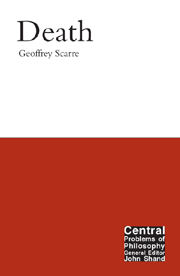5 - The evil of death
Summary
Epicurus's argument
In one of the most touching poems from A. E. Housman's cycle A Shropshire Lad, a dead ploughboy poses plaintive questions to a living friend:
Is my team ploughing,
That I was used to drive
And hear the harness jingle
When I was man alive?
Is football playing
Along the river shore,
With lads to chase the leather,
Now I stand up no more?
Is my girl happy,
That I thought hard to leave,
And has she tired of weeping
As she lies down at eve?
(A Shropshire Lad, in Collected Poems [1939: 42–3])The friend's answers, given in the intervening and final verses, are unlikely to bring the ploughboy much comfort. The living man assures the dead that his presence is not much missed and that things go on quite well without him (archly adding that it has fallen to him to “cheer a dead man's sweetheart”). Intuitively, death seems bad because the dead miss out on the good things of life. In the case of a youthful decedent like the ploughboy, the loss appears particularly severe because it is not just present satisfactions that are foregone but the opportunities for future ones that would have been available in a fuller lifespan. Housman's poem suggests that there can be subtler losses too: the dead ploughboy is gradually fading from his friends' thoughts and affections and can expect soon to be forgotten.
- Type
- Chapter
- Information
- Death , pp. 85 - 110Publisher: Acumen PublishingPrint publication year: 2006

